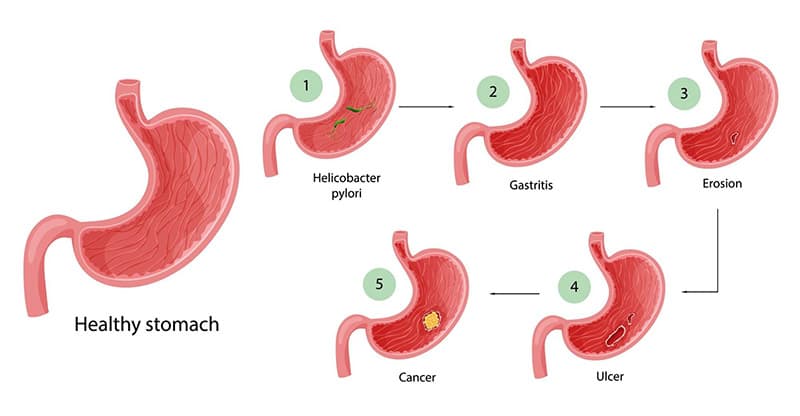Helicobacter pylori
Helicobacter pylori is a bacterium that infects the stomach lining and is a common cause of chronic gastritis. It is linked to peptic ulcers, gastric inflammation, and, in some cases, stomach cancer.
Richmond Gastroenterology Centre
Dr. John Hsiang
MBChB (NZ), FRACP (Australasia), MD (Doctorate), FRCP (Edinburgh), FAMS (Gastro)
Dr. John Hsiang is a distinguished gastroenterologist in Singapore with extensive training and experience in digestive health. He obtained his Fellowship of the Royal Australasian College of Physicians in Gastroenterology in 2012 and holds a PhD in viral hepatitis and fatty liver disease research.
He provides care for a broad range of digestive and liver concerns, combining thorough evaluation with tailored management to support patients’ long-term well-being.
Dr Hsiang is skilled in performing gastroscopy (upper endoscopy) and colonoscopy to investigate symptoms, detect stomach and colon cancers at an early stage, and provide timely treatment options.
With a commitment to individualised care, he applies an evidence-based approach that prioritises accuracy, effectiveness and patient comfort at every stage of diagnosis and treatment.
Languages Spoken:
English, Mandarin and Hokkien
Fellowship Trained Specialist
20+ Years of Clinical Experience

What is Helicobacter pylori?
H. pylori is a common infection in Singapore, affecting around 31% of the population, often without symptoms.
Persistent infection may lead to ulcers and long-term complications. According to a 2023 systematic review in BMC Infectious Diseases, H. pylori is the leading risk factor for gastric cancer, accounting for a substantial proportion of cases worldwide.
Early detection and treatment with antibiotics and acid-suppressing medication can help clear the infection, relieve symptoms, and reduce the risk of serious outcomes.
How is H. pylori Transmitted?
Helicobacter pylori is typically spread from person to person through direct contact with saliva, vomit or stool. It may also be transmitted through contaminated food, water, or utensils, especially in areas with poor sanitation or overcrowded living conditions.
The infection is usually contracted in childhood, often without symptoms, and may persist for years if left untreated. However, it can also be transmitted in adulthood, particularly through close contact with an infected individual or exposure to contaminated sources.
Good hygiene practices, such as regular handwashing and consuming properly prepared food and clean water, can help reduce the risk of transmission at any age.
How Do I Know If I Have H. pylori?
Helicobacter pylori infection often does not cause noticeable symptoms. However, when symptoms do occur, they may include abdominal discomfort, bloating, nausea and loss of appetite. Some individuals may also experience a burning sensation in the stomach, particularly when the stomach is empty.
If you experience persistent digestive symptoms or discomfort, it’s advisable to seek medical evaluation. Additional signs may include:
Symptoms
- Burning or gnawing abdominal pain, often worse when the stomach is empty.
- Bloating or feeling full quickly after eating.
- Nausea or episodes of vomiting.
- Unexplained weight loss.
- Frequent burping or bad breath.
- In some cases, dark stools or signs of anaemia due to bleeding ulcers.
How is Helicobacter pylori Diagnosed?
Helicobacter pylori can be diagnosed using several methods, depending on your symptoms and medical history. Common diagnostic options include:
- Gastroscopy (Endoscopy)– In cases of persistent or more severe symptoms, a specialist may recommend an endoscopy to examine the stomach lining directly and obtain tissue samples (biopsy) for confirmation.
- Urea Breath Test – A non-invasive and accurate test that detects H. pylori by measuring carbon dioxide in your breath after you consume a special solution. Accuracy about 95-97%.
- Blood Test – This test checks for antibodies to H. pylori. While useful for initial screening, it may not distinguish between a current or past infection. Accuracy is 80-85% for current infections.
Your doctor will recommend the most appropriate test based on your condition. Early detection is crucial for relieving symptoms and preventing complications, such as ulcers or gastric inflammation.
How is H. pylori Treated?
Helicobacter pylori is usually treated with a combination of medications aimed at clearing the infection and promoting healing of the stomach lining.
The standard approach is known as triple therapy, which includes:
- Two antibiotics – to eliminate the bacteria
- One acid-suppressing medication (such as a proton pump inhibitor) – to reduce stomach acid and improve treatment effectiveness
In certain cases, especially if initial treatment is not successful, a quadruple therapy may be recommended, which includes an additional medication to enhance the outcome.
Treatment typically lasts 10 to 14 days, and it is important to take all medications as prescribed to ensure the infection is properly resolved. A follow-up test, such as a urea breath test, may be advised to confirm successful eradication.
Completing treatment can help relieve symptoms, prevent ulcers, and lower the risk of long-term complications such as chronic gastritis or stomach cancer.
50%
30-40%
Infection in Singapore
Breath Test vs Gastroscopy: What’s the Difference?
Both the urea breath test and gastroscopy are commonly used to diagnose Helicobacter pylori. The choice of test depends on your symptoms, medical history, and the level of evaluation needed.
| Urea Breath Test | Gastroscopy (Endoscopy) | |
|---|---|---|
| Type of test | Non-invasive, outpatient. | Minimally invasive, performed with light sedation - Same-day discharge. |
| Purpose | Detects active H. pylori infection. | Detects H. pylori infection, examines the stomach lining and allows for tissue biopsy. |
| Procedure time | About 20–30 minutes. | About 15–30 minutes (plus brief recovery period). |
| When it’s used | For initial screening or follow-up. | Considered when symptoms are persistent or unexplained. |
| Additional insight | Detects presence of bacteria. | Provides visual assessment and further investigation if needed. |
| Insurance coverage | May not be eligible for insurance pre-authorisation. | Typically covered by insurance or MediSave. |
Your Treatment Journey: From Diagnosis to Recovery
Worried about digestive symptoms or H. pylori? Here’s what to expect at your gastroenterology visit:

Make an Appointment
For Emergencies
Specialist Consultation & Diagnosis
Your Treatment Plan
Patient Information
Urea breath test cost in Singapore
A consultation is an important first step to assess your condition thoroughly and determine the most appropriate tests and treatment plan based on your symptoms and medical history.
Cost of H. pylori treatment
Treatment costs may also vary between individuals, depending on factors such as recovery time, the type and duration of medication prescribed, and follow-up care required.
Can I use insurance to cover the cost of my screening?
Our clinic staff will assist with pre-authorisation processes and guide you on any eligible subsidies before the procedure.
For insurance-related enquiries, we encourage you to contact our clinic and consult your insurance provider for specific coverage details.
Can I prevent Helicobacter pylori infection?
Avoid sharing utensils, cups, or toothbrushes, especially in households where someone has tested positive for H. pylori.
Can H. pylori resolve on their own?
While some individuals may remain symptom-free for years, the bacteria can persist in the stomach lining and may eventually lead to complications such as gastritis, peptic ulcers, or, in some cases, stomach cancer.
Because of the potential long-term risks, H. pylori should be diagnosed and treated appropriately with a course of antibiotics and acid-suppressing medication.
Early treatment helps reduce symptoms and prevent more serious outcomes.
Consult Our Specialist
Experiencing digestive symptoms or discomfort? Speak to our gastroenterologist for a clearer understanding of your condition and treatment options.
You may book an appointment using our contact form or call the clinic at 6517 9958










